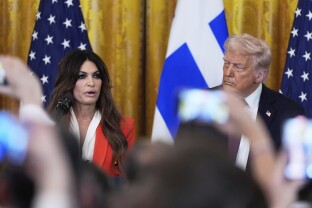What’s the price of an ambassadorship? Officially, it’s nothing. Yet increasingly, presidents aren’t picking as many career diplomats for the posts — the jobs are instead going to cash-rich donors.
Donald Trump’s ambassadorship nominees collectively donated almost $60 million in political contributions to Trump and other Republican candidates and committees in the two years leading up to their nominations, according to Federal Election Commission data.
That sum is nearly three times what Joe Biden’s non-career ambassadors and their spouses donated to Democratic committees in the 10 years leading up to their nominations, according to a 2023 report from the Campaign Legal Center. Meanwhile, Trump has only filled about a quarter of the posts.
NOTUS analyzed FEC data and outside reports to find that Trump’s nominees — entirely non-career picks so far — contributed millions to the president and other Republican candidates and committees during the 2023-24 election cycle. That number is only poised to grow as Trump continues to make appointments.
Trump has tapped an array of individuals, almost all wealthy businesspeople, to fill 48 of the 195 ambassador posts.
Among Trump’s second term nominees, the biggest donor according to FEC data is Arkansas business magnate Warren Stephens, tapped to serve as ambassador to the United Kingdom. Stephens alone donated roughly $27 million in the two years prior to his nomination. Spokespeople for Stephens declined to comment.
Excluding Stephens, an outlier, the average contribution among Trump’s nominees who made political contributions is about $1.8 million.
“It’s a well-known problem,” said Kedric Payne, vice president, general counsel, and senior director of ethics at the Campaign Legal Center. “Ambassadors are selected in a way that suggests that their campaign contributions and not their qualifications are the reason for the post. That is a problem because our relationships with different nations around the world can be greatly impacted or affected by someone who is not particularly qualified for their position.”
According to the American Foreign Service Association’s database, Trump has not made any career appointments, individuals who are professional civil servants within the U.S. Department of State.
Instead, his nominees are largely friends, businesspeople and donors. Trump is far from the first president to make big-dollar donors diplomats — it’s common among Democratic and Republican presidents alike. But even at this early stage, with only about a quarter of the positions filled, the amount of money Trump’s picks have donated is outsized.
Biden’s non-career ambassadors and their spouses donated $22 million to Democratic committees in the 10 years leading up to their nominations, the Campaign Legal Center found. Among fewer people and across a shorter period, Trump’s nominees have blown that number out of the water.
Part of this is a function of elections just being more expensive year after year. But it can’t be ignored that many in Trump’s slate of picks are just rich.
Florida legal executive Dan Newlin, who Trump has selected to serve as ambassador to Colombia, donated about $7 million in the two years leading up to his nomination. Melinda Hildebrand, a Texas philanthropist, donated about $4 million in that same period. She’s been tapped to serve as ambassador to Costa Rica. Newlin did not respond by press time, and Hildebrand could not be reached.
The Foreign Service Act of 1980 was explicitly designed to prevent ambassadorships from being part of quid pro quo transactions between presidents and their donors. It stipulates that appointees “should possess clearly demonstrated competence to perform the duties of a chief of mission” — the Senate takes this into consideration when confirming nominees.
But Payne said that in many cases, the Senate does not hold nominees to that standard. Senator James Risch is chair of the Senate Foreign Relations Committee, which is currently holding confirmation hearings and reviewing nominees.
“President Trump’s nominees are well qualified and fit to address the threats America faces around the world,” he told NOTUS in a statement. “I look forward to continuing our quick pace to confirm President Trump’s national security nominees and engaging with the hundreds more political and career appointments to come under this administration.”
Not all of Trump’s nominees are big-dollar donors, according to the FEC data. Lou Rinaldi hasn’t donated a dime in the past two years, but the two are longtime friends.
“Lou is a great golfer, and will be in a country with some terrific courses,” Trump said upon Rinaldi’s nomination. “Having grown up in Uruguay, he possesses an intimate understanding of the Country’s culture and history.”
Former Fox News host (and ex-fiancée of Donald Trump Jr.) Kimberly Guilfoyle was selected to serve as ambassador to Greece. Guilfoyle and Leah Francis Campos, who was nominated to be the ambassador to the Dominican Republic, made no contributions save for single, conspicuously identical $47 donations to WinRed. Campos did not respond by press time, and Guilfoyle could not be reached.
Charles Kushner, selected to serve as ambassador to France, donated about $2 million over two years. Kushner is also the father of Jared Kushner, Trump’s son-in-law and former senior adviser. Charles Kushner did not respond by press time.
“All of President Trump’s appointments are extraordinarily qualified, which is why the Senate has confirmed them at an unprecedented pace,” Anna Kelly, White House deputy press secretary, told NOTUS in a statement. “He will continue to choose the most accomplished and talented individuals to serve across his administration.”
—
Violet Jira is a NOTUS reporter and an Allbritton Journalism Institute fellow.
Sign in
Log into your free account with your email. Don’t have one?
Check your email for a one-time code.
We sent a 4-digit code to . Enter the pin to confirm your account.
New code will be available in 1:00
Let’s try this again.
We encountered an error with the passcode sent to . Please reenter your email.


